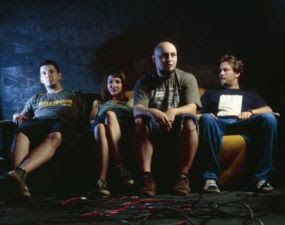Zero to Infinity: A History of Numbers lectured by Edward B. Burger
 In previous entries I have described how I got hooked on the The Teaching Company courses and especially on the ones lectured by the mathematician Edward B. Burger. After Introduction to Number Theory and The Joy of Thinking I only had one such math course to watch and that was From Zero to Infinity: A History of Numbers.
In previous entries I have described how I got hooked on the The Teaching Company courses and especially on the ones lectured by the mathematician Edward B. Burger. After Introduction to Number Theory and The Joy of Thinking I only had one such math course to watch and that was From Zero to Infinity: A History of Numbers.At first I thought it was a tame version of the course about number theory, only a bit more historical. It started up with how people moved from counting thing to an abstract understanding of numbers, then the evolution of the concept of the number with the advent of zero, negative numbers, rations, irrational numbers, complex numbers, Π, etc. However, at the end, the story split quite a bit and became a course in its own right so now I am pretty glad I watched it as well.
It did start to bother me that the level of understanding required for these classes is pretty low and as such the lecturer is forced to repeat and over-exemplify things and avoid as much as possible math notation and equations. The model makes no sense to me. If the people watching were to be uneducated, would they really want to watch the courses? If they did, would they have the money to spare for them if they were stupid? And if they were not stupid or they would be young people interesting in the basics of science, wouldn't they be smart enough to raise the bar a bit? I mean, it's not TV. People actually have to make an effort to purchase and then watch these courses.
Anyway, Mr. Burger was cool as always, but I had issues with some of the concepts presented in the course and how they were presented. After a plethora of information about Pythagoreans and natural numbers and Π, the lecture about the number e was really basic. No real proofs, no examples of use, it was like it didn't belong in the course at all.
Then there was the thing about 0.(9) being equal to 1. I understood the theory behind it, but it just got me wondering what about integer part of 0.(9)? And, if one could use the reasoning behind the idea, then how come S=sum(x^n) with n=0..infinity is not always 1/(1-x) regardless of x? And how come it is considered possible for a real number to have different decimal expansions? Shouldn't it there be a theorem about the uniqueness of said decimal expansion for a specific number just as it is about the prime factorization in order for some of the proofs in the course to make sense? I intend to write an email about it to Burger himself and if (with a godly voice from the sky :)), he answers me, I will be able to complete this entry.
That being said, I thoroughly enjoyed the course, although the one about number theory remains my favourite from this lecturer.
Update: Mr. Burger was kind enough to answer my questions. Here is his reply:
You are correct, there are examples for which the decimal expansion is not unique (and it only happens when we have an infinite tail of 9s). Here are two quick ways of convincing yourself about 0.(9):
1) I bet you feel very comfortable with the identity: 1/3 = 0.(3). Now multiply by 3: 1 = 0.(9)! Fun.
2) Suppose that 0.(9) does NOT equal 1. Then I'm sure you would guess it would be SMALLER than 1. Now recall that if we have two DIFFERENT numbers and we AVERAGE them, then the average will be larger than the smaller number and also smaller than the larger number (the average is in between them). So let's find the average: add: 1 + 0.(9) = 1.(9). Now divide by 2 and we see the average is 0.(9)... but that's one of the numbers we were averaging! Whoops.. therefore the numbers must be equal.







